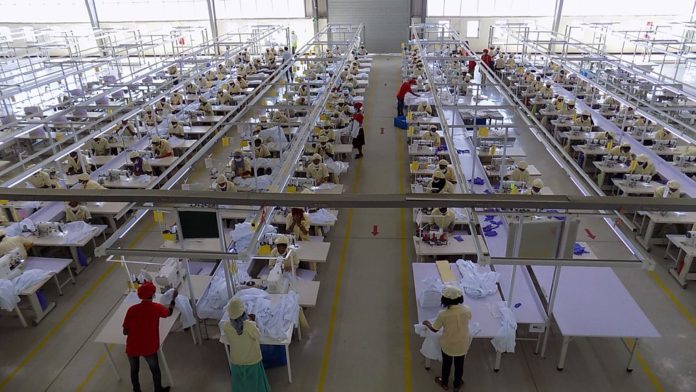In brief
-
Companies targeting Ethiopia are mostly apparel makers and other light industry players
-
Recent development in the rail sector in the country has helped boost the manufacturing sector
-
With a population hovering around 100 million, Ethiopia is the second most populous nation in Africa after Nigeria
-
Manufactures cite cheap labour as a the main reason for investing in Ethiopia
Cheap labour is attracting international manufacturing firm to Ethiopia, the horn of African country that recently beat Kenya to become the regional economic powerhouse.
Companies targeting Ethiopia are mostly apparel makers and other light industry players. But General Electric plans to manufacture medical equipment in the country, and Samsung Electronics is working with a local partner to produce printers. Meanwhile, Hyundai Motor reached an agreement with Ethiopian companies in May regarding construction of a plant to assemble commercial vehicles.
Ethiopia’s main exports currently include coffee, gold and leather products, but the government is stepping up efforts to develop new industries. Arkebe Oqubay, special adviser to Prime Minister Hailemariam Desalegn, has pledged to transform Ethiopia from a farm economy into an industrial powerhouse.
Thanks to planned opening of a new railway line to a port in neighboring Djibouti, located on the Horn of Africa in the Arabian Sea, Ethiopia hasa force to reckon with in the textile industry. The railway line is expected to facilitate transport of goods from the landlocked country’s industrial areas, like the Bole Lemi Industrial Park, an hour’s drive from the capital Addis Ababa.
Opened in 2015, the sprawling 150-hectare park is bustling with Chinese, Taiwanese and South Korean production facilities, conveniently clustering factories for textiles, apparel products and leather shoes in one area
As part of its efforts to turn the country into an thriving, middle-income economy by 2025, the government has been building industrial parks. The newest is Hawassa Industrial Park, a one-hour flight from the capital. Among the 15 companies with manufacturing facilities there is PVH, a U.S. apparel company.
With a population hovering around 100 million, Ethiopia is the second most populous nation in Africa after Nigeria. The country’s young, low-wage workforce gives it the potential to grow into a major garment-sourcing hub with a vibrant market.

